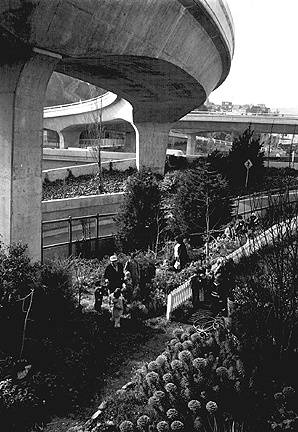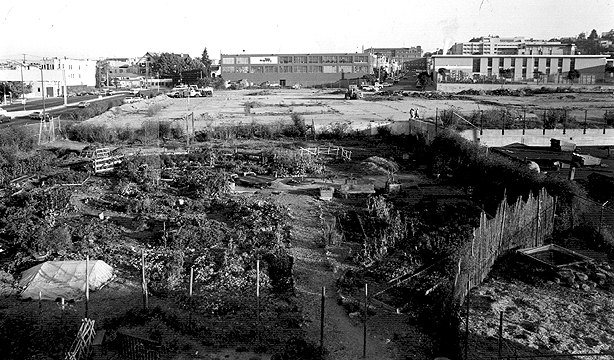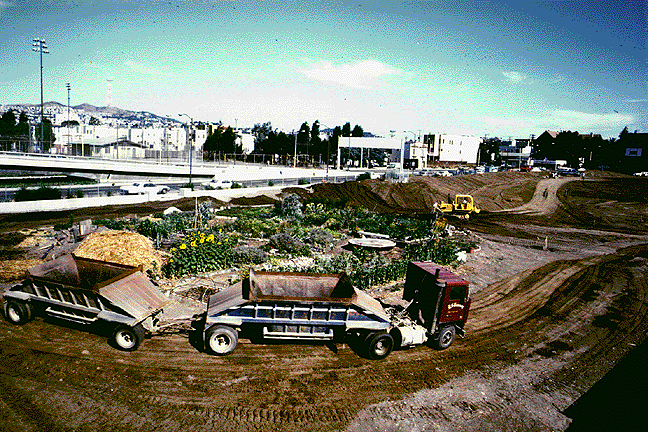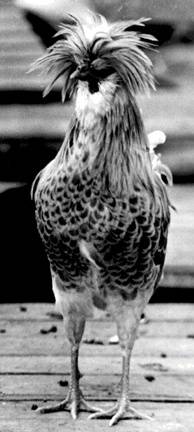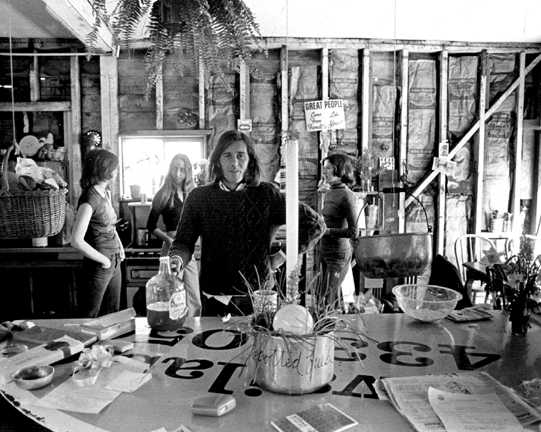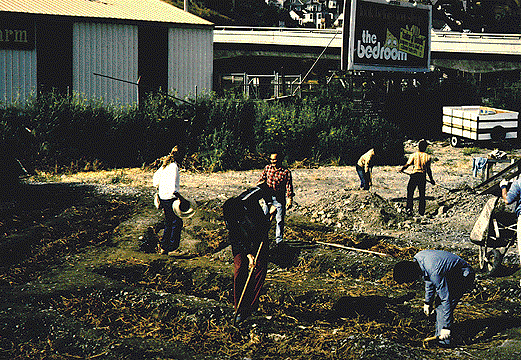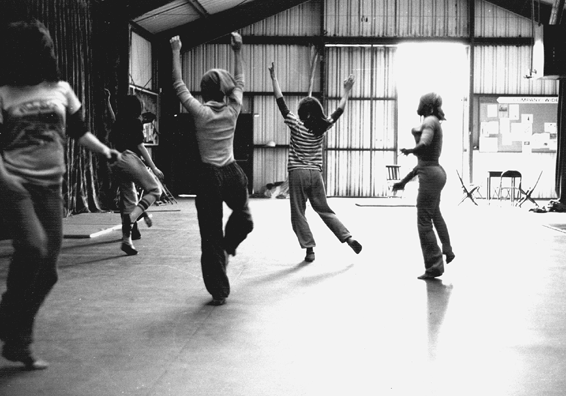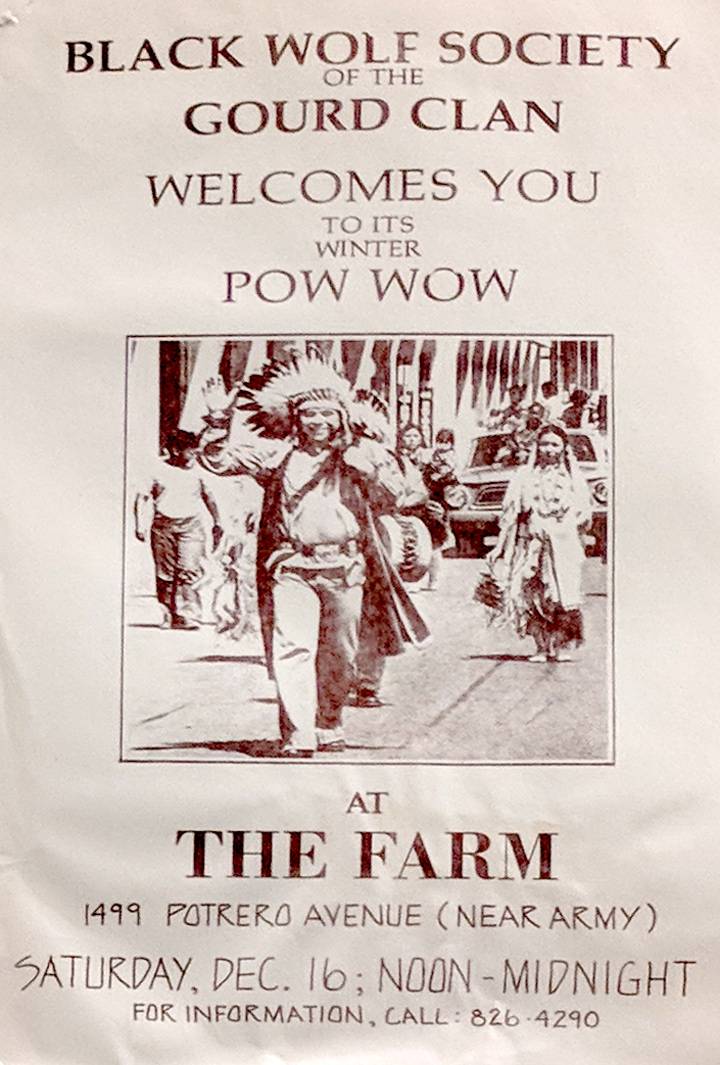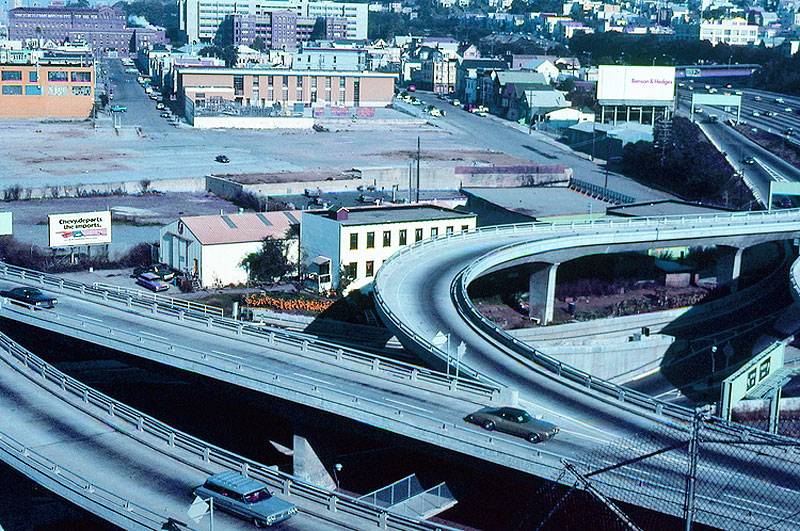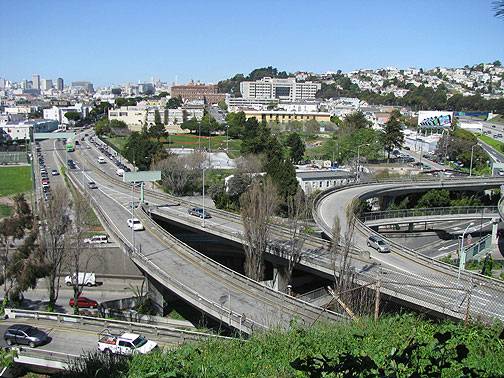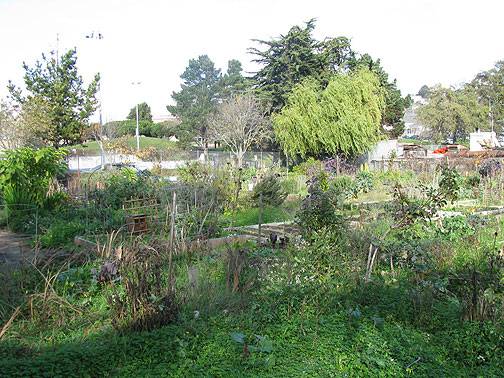The Farm: Difference between revisions
No edit summary |
No edit summary |
||
| (19 intermediate revisions by 3 users not shown) | |||
| Line 1: | Line 1: | ||
'''<font face = Papyrus> <font color = maroon> <font size = 4>Historical Essay</font></font> </font>''' | |||
''by Chris Carlsson'' | |||
<iframe src="https://archive.org/embed/FarmDoc40min" width="640" height="480" frameborder="0" webkitallowfullscreen="true" mozallowfullscreen="true" allowfullscreen></iframe> | |||
'''"The Farm", a 47-minute documentary by Mike Kavanagh, MaryEllen Churchill, and Kathy Katz, produced by Jack Wickert.''' | |||
''Video: courtesy Mike Kavanagh'' | |||
[[Image:ecology1$farm-under-freeway.jpg]] | [[Image:ecology1$farm-under-freeway.jpg]] | ||
'''The Farm huddled beneath Highway 101''' '' | '''The Farm huddled beneath Highway 101''' | ||
''Photo: Jack Wickert'' | |||
[[Image:FMBWNOPK.GIF]] | |||
'''The Farm's beginnings, prior to any construction of [[La Raza Park|La Raza Park]] next door, c. 1974.''' | |||
''Photo: Jack Wickert'' | |||
[[Image:FMBDOZR2.GIF]] | |||
'''City bulldozers clear area for park, but leave part of garden intact due to court order.''' | |||
''Photo: Jack Wickert'' | |||
[[Image:ecology1$rooster.jpg]] | [[Image:ecology1$rooster.jpg]] | ||
| Line 7: | Line 31: | ||
'''One of the not-so-human inhabitants of The Farm''' | '''One of the not-so-human inhabitants of The Farm''' | ||
'' | ''Photo: Jack Wickert'' | ||
The Farm was | ''"The Farm was an eruption of nature in the middle of the concrete jungle . . . proving that life could still exist there."'' —Joan Holden, SF Mime Troupe | ||
Jack Wickert and Bonnie Sherk moved on the abandoned, desolate asphalt of the former | The [[The Farm by the Freeway|Farm]] was a unique "autonomous zone" that lived under the freeway interchange of Highway 101, (then-)Army Street, and [[Northerly view from Bernal |Bayshore Boulevard/Potrero Avenue]]. It began in 1974 and ended in a sad eviction in 1987. It was a farm with farm animals, gardens, a theater, a school, an art gallery, communal kitchen, a punk rock club, and a challenge to the prevailing values in the city. Their effort spawned a 4.5 acre park, which became today's La Raza Park. It was a place occupied by a spontaneous, grassroots, independent, autonomous collective organization that created itself. | ||
[[Image:JK WOMEN.GIF]] | |||
'''Jack Wickert at the Farm, c. 1975''' | |||
''Photo courtesy Jack Wickert'' | |||
[[Image:FMWKPRTY.GIF]] | |||
'''Work party at The Farm, c. 1975''' | |||
''Photo: Jack Wickert'' | |||
[[Oral History: Jack Wickert|Jack Wickert]] and Bonnie Sherk moved on the abandoned, desolate asphalt of the former [[Borden Dairy|Borden Dairy]] in 1974, intending to tear up the concrete and build a model farm to environmental education for school children. They founded the Crossroads Community and inspired a community of artists to help transform the space. Ultimately an incredible mix of people shared in some part of the Farm experience: elderly, school kids, all ages, all races, wildly diverse values and expressions. Local kids were drawn into gardening by the gardeners to stop them from carelessly wrecking the gardens. They grew Swiss chard, lettuce, cabbage, tomatoes, corn, potatoes, onions, garlic, cucumbers and numerous kinds of squash. | |||
[[Image:FMKIDNC2.GIF]] | |||
'''Dance rehearsal at The Farm, c. 1976''' | |||
''Photo: Jack Wickert'' | |||
The San Francisco Mime Troupe came to depend on it as a rehearsal space, as did a number of other performance groups. Meanwhile over 70 farm animals co-existed with special classes for K-3, kid-produced theater on the big stage, rehearsals, an art gallery, regular pageants, festivals, youth group gatherings, outdoor shows. | The San Francisco Mime Troupe came to depend on it as a rehearsal space, as did a number of other performance groups. Meanwhile over 70 farm animals co-existed with special classes for K-3, kid-produced theater on the big stage, rehearsals, an art gallery, regular pageants, festivals, youth group gatherings, outdoor shows. | ||
| Line 17: | Line 61: | ||
Rhodessa Jones: "The farm was one of those early industrial, multi-purpose, multi-disciplinary, multi-cultural spaces in San Francisco." | Rhodessa Jones: "The farm was one of those early industrial, multi-purpose, multi-disciplinary, multi-cultural spaces in San Francisco." | ||
The punk era came to The Farm from 1983-86. Bands such as MDC, Tragic Mulatto, Polkacide, DOA, Descendents, and many others rattled eardrums at Farm shows. | The [[Oral History: Andrew Pollack|punk era came to The Farm]] [go to 5th clip in Pollack interview to hear more] from 1983-86. Bands such as MDC, Tragic Mulatto, Polkacide, DOA, Descendents, and many others rattled eardrums at Farm shows. | ||
A protracted legal struggle between Farm tenants and the landlords included a Temporary Restraining Order gotten by the Farm to prevent any damage to their gardens in September, 1981, until finally all avenues of appeal were exhausted and they were evicted on November 5, 1987. The landlords claimed they would be willing to rent to anyone at "fair market value" except the current residents of The Farm. | A protracted legal struggle between Farm tenants and the landlords included a Temporary Restraining Order gotten by the Farm to prevent any damage to their gardens in September, 1981, until finally all avenues of appeal were exhausted and they were evicted on November 5, 1987. The landlords claimed they would be willing to rent to anyone at "fair market value" except the current residents of The Farm. | ||
''"They had to step on it because it existed and flourished outside all official channels, it was out of control . . . The same reason we loved it and it represented life to us, they had to kill it . . . because it represented disorder, misrule, anarchy. . ." '' | [[Image:Winter-Powwow-at-The-Farm.jpg]] | ||
'''One of many events held at The Farm in the late 1970s.''' | |||
''Image: [[Legacy of the Neighborhood Arts Program|Neighborhood Arts Program]], San Francisco Arts Commission'' | |||
<blockquote>''"They had to step on it because it existed and flourished outside all official channels, it was out of control . . . The same reason we loved it and it represented life to us, they had to kill it . . . because it represented disorder, misrule, anarchy. . ." '' | |||
—Joan Holden, playwright, SF Mime Troupe, in ''The Farm'', a documentary film by Kathy Katz and Mike Kavanagh, produced by Jack Wickert. </blockquote> | |||
[[Image:Telephoto-of-Farm-plots-under-the-Highway-101-ramps-Holladay-Avenue-and-Peralta-Avenue---1975- k-d 1514338.jpg]] | |||
'''Farm plots at their 1975 beginnings under the Highway 101 ramps from Holladay Ave. and Peralta Ave.''' | |||
''Photo: Max Kirkeberg collection diva.sfsu.edu'' | |||
[[Image:TheFarm-LaRazaPark-09 7999.jpg]] | |||
'''Site of The Farm and [[La Raza Park|La Raza Park]], as seen from Bernal Heights, 2009.''' | |||
''Photo: Chris Carlsson'' | |||
[[Image:Potrero-del-sol-garden 5674.jpg]] | |||
'''Potrero del Sol garden, still flourishing in 2009, more than two decades after the demise of The Farm.''' | |||
''Photo: Chris Carlsson'' | |||
<hr> | |||
[[Image:Tours-food.gif|link=Arresting 'Food Not Bombs' is Censorship]] [[Arresting 'Food Not Bombs' is Censorship| Continue Food Tour]] | |||
[[Sewerage | Prev. Document]] [[FIRE! | Next Document]] | [[Sewerage | Prev. Document]] [[FIRE! | Next Document]] | ||
[[category:Ecology]] [[category:1970s]] [[category:1980s]] [[category:Mission]] [[category:Bernal Heights]] [[category:Potrero Hill]] [[category:dissent]] | [[category:Ecology]] [[category:1970s]] [[category:1980s]] [[category:Mission]] [[category:Bernal Heights]] [[category:Potrero Hill]] [[category:dissent]] [[category:Indigenous]] [[category:Gardens]] | ||
Latest revision as of 21:20, 18 September 2023
Historical Essay
by Chris Carlsson
<iframe src="https://archive.org/embed/FarmDoc40min" width="640" height="480" frameborder="0" webkitallowfullscreen="true" mozallowfullscreen="true" allowfullscreen></iframe>
"The Farm", a 47-minute documentary by Mike Kavanagh, MaryEllen Churchill, and Kathy Katz, produced by Jack Wickert.
Video: courtesy Mike Kavanagh
The Farm huddled beneath Highway 101
Photo: Jack Wickert
The Farm's beginnings, prior to any construction of La Raza Park next door, c. 1974.
Photo: Jack Wickert
City bulldozers clear area for park, but leave part of garden intact due to court order.
Photo: Jack Wickert
One of the not-so-human inhabitants of The Farm
Photo: Jack Wickert
"The Farm was an eruption of nature in the middle of the concrete jungle . . . proving that life could still exist there." —Joan Holden, SF Mime Troupe
The Farm was a unique "autonomous zone" that lived under the freeway interchange of Highway 101, (then-)Army Street, and Bayshore Boulevard/Potrero Avenue. It began in 1974 and ended in a sad eviction in 1987. It was a farm with farm animals, gardens, a theater, a school, an art gallery, communal kitchen, a punk rock club, and a challenge to the prevailing values in the city. Their effort spawned a 4.5 acre park, which became today's La Raza Park. It was a place occupied by a spontaneous, grassroots, independent, autonomous collective organization that created itself.
Jack Wickert at the Farm, c. 1975
Photo courtesy Jack Wickert
Work party at The Farm, c. 1975
Photo: Jack Wickert
Jack Wickert and Bonnie Sherk moved on the abandoned, desolate asphalt of the former Borden Dairy in 1974, intending to tear up the concrete and build a model farm to environmental education for school children. They founded the Crossroads Community and inspired a community of artists to help transform the space. Ultimately an incredible mix of people shared in some part of the Farm experience: elderly, school kids, all ages, all races, wildly diverse values and expressions. Local kids were drawn into gardening by the gardeners to stop them from carelessly wrecking the gardens. They grew Swiss chard, lettuce, cabbage, tomatoes, corn, potatoes, onions, garlic, cucumbers and numerous kinds of squash.
Dance rehearsal at The Farm, c. 1976
Photo: Jack Wickert
The San Francisco Mime Troupe came to depend on it as a rehearsal space, as did a number of other performance groups. Meanwhile over 70 farm animals co-existed with special classes for K-3, kid-produced theater on the big stage, rehearsals, an art gallery, regular pageants, festivals, youth group gatherings, outdoor shows.
Rhodessa Jones: "The farm was one of those early industrial, multi-purpose, multi-disciplinary, multi-cultural spaces in San Francisco."
The punk era came to The Farm [go to 5th clip in Pollack interview to hear more] from 1983-86. Bands such as MDC, Tragic Mulatto, Polkacide, DOA, Descendents, and many others rattled eardrums at Farm shows.
A protracted legal struggle between Farm tenants and the landlords included a Temporary Restraining Order gotten by the Farm to prevent any damage to their gardens in September, 1981, until finally all avenues of appeal were exhausted and they were evicted on November 5, 1987. The landlords claimed they would be willing to rent to anyone at "fair market value" except the current residents of The Farm.
One of many events held at The Farm in the late 1970s.
Image: Neighborhood Arts Program, San Francisco Arts Commission
"They had to step on it because it existed and flourished outside all official channels, it was out of control . . . The same reason we loved it and it represented life to us, they had to kill it . . . because it represented disorder, misrule, anarchy. . ." —Joan Holden, playwright, SF Mime Troupe, in The Farm, a documentary film by Kathy Katz and Mike Kavanagh, produced by Jack Wickert.
Farm plots at their 1975 beginnings under the Highway 101 ramps from Holladay Ave. and Peralta Ave.
Photo: Max Kirkeberg collection diva.sfsu.edu
Site of The Farm and La Raza Park, as seen from Bernal Heights, 2009.
Photo: Chris Carlsson
Potrero del Sol garden, still flourishing in 2009, more than two decades after the demise of The Farm.
Photo: Chris Carlsson

